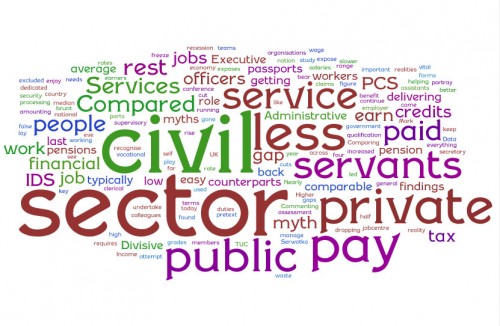
A letter published in the Financial Times on 25th February 2011 exposes the myth of the Public Sector stereotype:
Looking to hire? You’ll get a great recruit from the public sector
From Mr Ian Watmore,
Sir, I read Brian Groom’s report (February 21) on the perceived limited employability of public servants in the private sector with great dismay. As one who has worked for 25 years in the private sector, and now six in the public sector, my message is simple.
If you are looking to hire into your company, forget the myths and stereotypes, you will get a great recruit from the public sector.
Why do I say that? Because I cannot think of a single skill that one needs in the private sector that people don’t develop in spades in the public sector.
Operational management? What about running a prison of sex offenders. Technology skills? Nothing comes close to the scale and complexity of the tax and benefits system. Commercial skills? Have you ever let a contract for a science facility that accelerates electrons to near light speed? Customer relations? We serve everyone from the young and old, rich and poor, ill and healthy. Turnarounds? A failing company is one thing, a failing secondary school on a sink estate is quite another. Mergers and acquisitions? Try taking over a collapsing bank in a weekend. Human resources? Just imagine what is involved in sending civilians into Helmand province. Security? I’d have to shoot you if I told you what our security services do on a daily basis, but, trust me, we are lucky to have them. Public relations? Well, we are always in the Thick of It!
Even business development is hugely in evidence as civil servants promote Britain’s interests abroad, or work in successful trading funds such as the Ordnance Survey or Companies House.
Public servants manage complex, multi-billion pound businesses – indeed, my last job oversaw an annual budget of £20bn. It is this level of challenge that continues to attract the best graduates every year. Latest figures show that more than 22,000 people showed an interest in just over 600 Fast Stream jobs.
In my six years I have managed staff in Norwich and Newport, Sheffield and Scotland, Warrington and West Midlands, Liverpool and London. I am proud of every one of them, for the unsung successes they achieve, and the family and national crises they avert. I learnt much in my 25 years in business, but I continue to learn so much in the public sector too.
Many former civil servants can be found in FTSE 100 companies at all levels. Only this week, one of my most senior managers is leaving to join a renowned multinational committed to innovation and technology. This should be no surprise. The civil service has invested heavily in increasing its professionalism and now compares favourably when independently benchmarked with the private sector.
As the public sector shrinks to balance the budget deficit, we are letting go many talented people, for whom the job itself is as much the reward as the remuneration.
So please, forget the stereotypes, and join the ranks of the enlightened companies that are hiring people from the public sector. They will give you a great deal in both senses of the phrase.
Ian Watmore
Chief Operating Officer
UK Government
Permanent Secretary, Cabinet Office








Oh but Civil servants are the enemy of enterprise, Dave said so it must be true!!!!
Seriously it’s good to see this written. Thanks for sharing
Dave, the truth and the LibDems are becoming very fragile…
There are, however, many “Civil Servants” out there who are far from civil and certainly don’t regard themselves as servants (yes I know I am misunderstanding the term, but still…) Jams and Cherie excepted, I’m sure – at least on their good days. I’ve dealt with good and bad (like most sectors) but the trouble with bad civil servants is you still have to deal with them, you’ve got no choice, unlike bad companies, where you can take your business somewhere else.
It would still be the same if the services were privatised. Public services seem to be taken over by a handful of multi-Corporate bodies who don’t provide good services and you still wouldn’t be able to take your business elsewhere…
True, it’s an issue of individuals having to deal with government, whether done through a private contractor or via a Civil Service, although a private service-provider knowing that its contract is due for periodic renewal in the face of competition from rival bidders might make more of an effort to deal efficiently with complaints, and more of an effort not to waste fortunes on ill advised IT initiatives (for example) if they knew the financial cost of any such fiasco would be borne by them (probably at the cost of the contract) rather than always having the taxpayer available to fund the repair of any disasters.
although a private service-provider knowing that its contract is due for periodic renewal in the face of competition from rival bidders might make more of an effort to deal efficiently with complaints
I would like to think that would be the case but in practice it doesn’t seem to work like that.
The problem with the IT systems is that they don’t consult with the user properly and develop something that isn’t appropriate for the job. So we get back your first comment which is having to deal with the government. That in my opinion is where the problem is not with the providers of the services.
I thought you might like to read this post from Subrosa, the Dundee Wifey who blames the recent £6.3 billion loss of stores on Civil Servants (or 90% of the blame). more bureaucratic inefficiency
Thank you, I couldn’t resist commenting